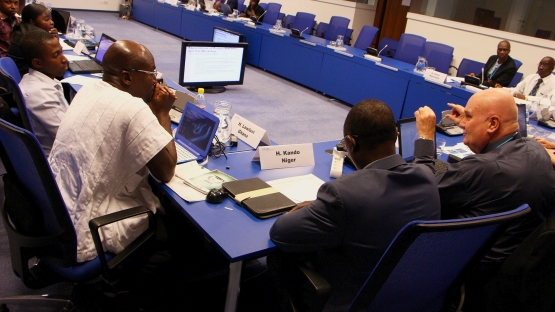Although still nascent, the fields of nuclear technology and applications are quickly growing throughout the African continent. From Morocco's promising nuclear power program to Mozambique's developing radiotherapy clinic, the regional strides in capacities and infrastructures are undeniable. However, this technical progress requires corresponding progress in the realms of safety and security. Reflecting that requirement, the IAEA is supporting the renewal and reinforcement of regulations addressing naturally occurring radioactive material (NORM) through an ongoing Technical Cooperation (TC) project to strengthen regulatory infrastructure in the African region from cradle to grave.
The Earth's crust abounds with naturally occurring radionuclides-from radioactive isotopes of uranium, thorium and potassium, to their decay products, such as radium and radon. Radionuclides, such as uranium and possibly thorium, can represent important precursors to the safe generation of nuclear power. These natural occurring nuclides are present throughout the world but, unless extracted through mining and concentrated during subsequent milling processes, they rarely pose a significant threat to public or environmental safety. Unfortunately, the expansion of the extractive industry in the African region has brought radioactive materials "to the surface" and engendered a growing risk of exposure to workers, people and the environment. Impelled by the hazards posed by naturally-occurring radioactive material (NORM), 36 African Member States launched a TC project to establish and implement regional regulatory infrastructure for the safe management of NORM in accordance with IAEA Safety Standards.
From 14-18 July 2014, a Technical Coordination Meeting (TCM) was held in Tanzania in support of the ongoing project, and was attended by nearly 30 national nuclear regulators. In order to better organize efforts, the meeting participants were asked to identify their national priorities, the status of domestic nuclear regulations, and any other miscellaneous needs, and on that basis, Member States were sub-divided into three working groups, focused on control of public exposure, radioactive waste management, and NORM, in which they are participating as the project goes forward to address targeted challenges. The TCM produced a list of activities-applicable at both the regional and national levels-which is substantively helping to address Member State priorities. Highest among the activities was the need to establish a School of Drafting, which might support Member States in their efforts to draft rules and guidelines on NORM.
In response to those requests, a School for Drafting was convened, from 20-24 July, at the IAEA's Vienna headquarters. With the support of IAEA and international experts-who delivered presentations and led discussions-the School allowed participants the opportunity to discuss NORM-related challenges in the region and provided detailed guidance on how best to craft regulations which conform to the relevant international safety standards, while being fit-for-purpose. However, prior to receiving an overview on IAEA Safety Standards, regulatory oversight, and the authorization of NORM facilities, the School's attendants were asked to prepare and present Country Reports, sharing their national experiences and best practices with their regional counterparts. In addition, detailed questionnaires were submitted to gain insights on NORM-related facilities and activities being undertaken or planned in each country, in advance of the School. Through interactive group exercises and knowledge-sharing, the 24 participants succeeded in developing a plan and time-line to strengthen national regulations related to NORM and, where necessary, drafting new ones.
Although the quantities of radioactive waste generated in the African region are relatively limited, the risk of radionuclides contaminating the environment-through radon emanation, atmospheric transport, releases to aquatic environments, or dissolution in groundwater-nevertheless exists. Small steps have already been taken to curtail public and environmental exposure to naturally-occurring radioactive material and, with IAEA support, great strides will be made, as well.


